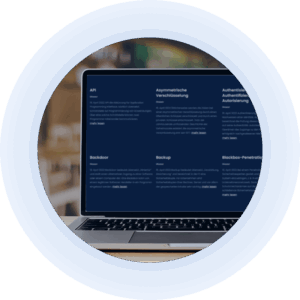
Hosted in Germany heißt übersetzt „untergebracht in Deutschland“ und bezieht sich auf Daten. Genauer: auf Websites, Software und Informationen, deren Daten auf deutschen Servern gespeichert werden. Frei übersetzt bedeutet „hosted in Germany“ also „gespeichert in Deutschland“.
In Deutschland gespeicherte Daten unterliegen dem deutschen Recht – dem vergleichsweise strengen deutschen Datenschutzrecht, dem BGB und HBG. Die betreffenden Daten werden auf deutschen Servern, also in einem Rechenzentrum in Deutschland gespeichert. Diese Daten verlassen Deutschland nicht, es sei denn, Sie als Auftraggeber verlangen dies. Dritte erhalten prinzipiell keinen Einblick in Ihre Daten. Dazu zählen auch ausländische Behörden, so lange sich keine Straftat ereignet hat. Im Falle einer Straftat müssen ausländische Behörden in Deutschland um Amtshilfe ersuchen und erhalten ggf. einen nach deutschen Gesetzen eingeschränkten Zugriff auf die erforderlichen Daten. Anders wird dies z. B. bei in den USA gehosteten Daten gehandhabt: Dort ist Behörden der Zugriff erlaubt.
Im Rahmen der DSGVO gelten zudem z. T. sehr strenge Regeln für den Schutz personenbezogener Daten und deren Speicherung in einem Drittland. Diesbezüglich ist es für deutsche Unternehmen einfacher, entsprechende Daten in Deutschland zu speichern. Auch als physische Objekte unterliegen deutsche Rechenzentren den deutschen Vorschriften. Zum Beispiel den vergleichsweise strengen Brandschutzmaßnahmen, die auch für Wohnhäuser gelten.
Es kann sein, dass Ihnen dieses Thema im Arbeitsalltag gar nicht begegnet. Zum Beispiel, wenn Ihr Unternehmensnetzwerk, Ihre Server und Unternehmenswebsite bereits aufgesetzt sind. Aber vielleicht befinden sich Server Ihres Unternehmensnetzwerkes bei Ihnen vor Ort – auch das ist hosted in Germany. Die Unternehmenswebseite wird häufig extern bei einem spezialisierten Anbieter gehosted, auch für ein Backup bietet sich dies an. Cloud-Lösungen können vor Ort gehosted werden oder bei einem externen Anbieter.
Die Sicherheit Ihrer in Deutschland gehosteten Daten können Sie zusätzlich verbessern, indem Sie achten auf:
Hosted in Germany refers to data. More specifically, it refers to websites, software and information whose data is stored on German servers. In other words, ‘hosted in Germany’ means ‘stored in Germany’.
Data stored in Germany is subject to German law – the comparatively strict German data protection law, the BGB and HBG. The data in question is stored on German servers, i.e. in a data centre in Germany. This data does not leave Germany unless you, as the client, request this. Third parties do not have access to your data. This also includes foreign authorities, as long as no criminal offence has been committed. In the event of a criminal offence, foreign authorities must request administrative assistance from Germany and may be granted access to the necessary data in accordance with German law. The situation is different for data hosted in the USA, for example, where authorities are permitted access.
Under the GDPR, there are also some very strict rules governing the protection of personal data and its storage in a third country. In this respect, it is easier for German companies to store such data in Germany. Even as physical objects, German data centres are subject to German regulations. These include, for example, the comparatively strict fire protection measures that also apply to residential buildings.
You may not encounter this issue at all in your everyday work. For example, if your company network, servers and company website are already set up. But perhaps your company network servers are located on your premises – this is also hosted in Germany. Company websites are often hosted externally by a specialised provider, which is also a good option for backups. Cloud solutions can be hosted on site or by an external provider.
You can further improve the security of your data hosted in Germany by paying attention to the following: